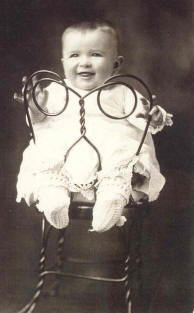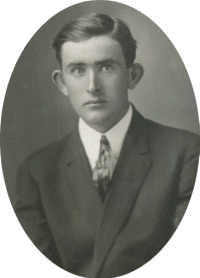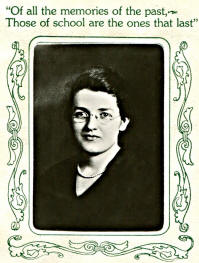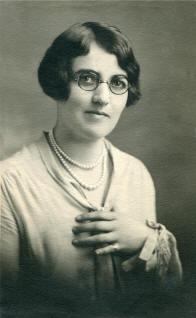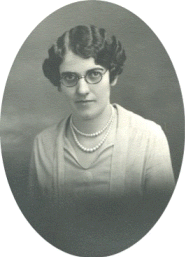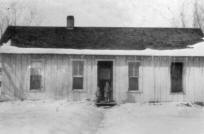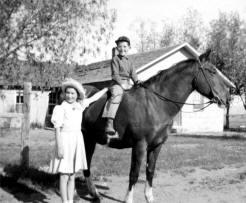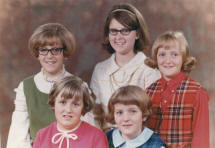| Gerald Leland Worley | ||
| January 21, 1894 - July 4, 1981 | ||
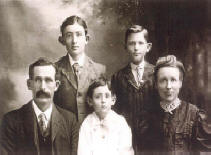 (L-R) George, Gerald, Charlie, Orville, Laura 1907
|
Gerald Leland Worley was born January 21, 1894 in Ollie, Keokuk County, Iowa. He finished the 8th grade and had to stop his formal education to help with the farming. He joined the Navy for World War I, serving primarily in Florida as an airplane mechanic. Upon discharge, he came home and the family packed up everything and came to the San Luis Valley in a railroad boxcar in 1919.
Gerald was an eligible bachelor and with good friend Baine Sutherland dated women from Del Norte. They went on drives, picnics, especially up toward Wagon Wheel Gap. Gerald met Vada David, a teacher in the Del Norte School. That ended the different dates. Vada had come to the Valley to visit her aunt, Ruth Harbour and her family. There was a vacancy in the Del Norte School because a teacher had gotten married. In those days married women were not allowed to teach. A neighbor of the Harbours was on the school board and knew Vada could teach. She finished that school year and came back the next year (1925-1926). Vada had taught several years in Kansas along with going to Southwestern College in Winfield, Kansas. She had started teaching right out of high school which was common then for the small country schools.
Vada was born in Winfield, Kansas November 25, 1898. Gerald and Vada were married December 30, 1926, at her parents’ home near Winfield, Kansas. They came home to a quarter of land just west of Gerald’s parents that he had bought from the elder Sutherlands. They lived there (9963 N Co Rd 4 West) for 56 years. They attended Sargent Community Church, serving on various boards. Gerald was one of the original members of the American Legion Post in Del Norte. Vada became an Auxiliary member, but was not very active. Her interests were Sargent Missionary and Mountain View Federated Club.
Farming was Gerald’s life. He served on the Del Norte Potato Cooperative Board for many years, and the Rio Grande Canal Water Users Association. He was one of the signers of the compact in the thirties with New Mexico and Texas for the rights on the Rio Grande. In later years, he said they did the wrong thing, but at the time it seemed the best for everyone. He also served as Precinct chairman for years – Precinct 13 and was County Chairman for the Republican Party several years.
A daughter, Twila Mae, was born September 15, 1927 at home. Gerald gave the potato harvest crew a day off on September 16. Quite unheard of then. Gerald always had milk cows, sheep and pigs. Chores took lots of time before he could go to the field whatever time of year. He also had beautiful horses and mules. They were work animals.
On June 19, 1930 Carl was born at home, too. A nurse was part of the household as well as a “hired girl” for awhile. Vada had trouble and of course, Twila was needing some care.
Both children thrived. They were given chores to do according to age and skill.
During on the depression years Dad worked for Blackwell Threshing. He had a team of big horses he used to haul water for the steam engine that ran the threshing machine. He got $1 a day for himself and the team with sleeping space in the bunk trailer, food at the mess trailer and hay and grain for the horses.
Mom did the milking and other chores. We kids helped the little we could. We had to sit on the corral gate while Mom milked so she would know where we were. She carried rocks in her sweater pocket when she went to bring the cows in to milk. One evening the bull was acting up so she threw a rock hitting him between the eyes. He started bellering and the cows circled around him and Mom thought she had killed him. Dad got home just then (Saturday night) thank goodness. He got things settled down, did the milking, sending us to the house. The bull was the most valuable animal we had. He was sold soon after that incident.
Along with the animals there were always lots of chickens. Baby chicks were gotten every spring. The roosters were butchered and sold. The pullets were added to the flock of hens to produce eggs. Eggs were “traded” for the items we needed, including shoes and piece goods at the general store called Fassetts in Monte Vista. The excess milk and cream went to a creamery in Del Norte. These were hard years but no one went hungry (large gardens, canning, butchering). We had clothes, warm houses, good schooling, loving family and good neighbors who helped one another. Family was important. All the Worleys went to Grandpa and Grandma’s at least once a month if possible. Neighbors gathered in the summer to play softball, visit and eat cake and homemade freezer ice cream. There were so many laughs and such good play and food.
In 1936 Mom and Dad added three rooms to our house. The adobe bricks were made from soil in a swale west of the barn. We all helped. Carl and I nailed lathe on the adobe so screen wire could be put on to hold the plaster and stucco. Dad put a stock tank in the attic before the roof was put on so we could have running water in the house. He put a gasoline engine on the well, piped to the tank and we had water, not hot, but didn’t have to carry it in anymore. We got Rural Electric Association electricity in 1938, I think. The house had been wired when remodeling was done. They added a sun porch (cinder-block) when I was in college.
December 7, 1941, we’d gone to Sunday school and church. When we got home Grandpa was there to tell us about the bombing of Pearl Harbor. He had a good radio which he listened to all the time. We’d planned to go to Kansas for Christmas, and we did. (Last time as a family). Mom stayed when Dad, Carl and I came home. Mom and her siblings were trying to settle their parents’ estate. Mom got sick and had to have surgery. Dad went back to be with her, leaving Carl and me at home to go to school and do chores. I don’t remember how long Dad was gone, but it seemed forever. A neighbor came to stay with us at night and bring supper. We had to wake her up before we got on the bus in the morning. Mom finally came home in March. Carl was a 6th grader and I was a Freshman.
Farming became a little more lucrative during the war years. Dad paid off the home place in March 1943. That was a celebration day! Sometime later he bought a quarter to the southwest of the home quarter. Some years he leased some additional land, but I can’t remember how much or when. Both Mom and Dad worked so hard and taught Carl and me to do so much. We collected scrap metal, had bond rallies, etc. Our harvest crews were Mexican Nationals and War Prisoners, who were housed in Monte Vista. School was still very important. I graduated in 1945 a few weeks after V-E Day, and Grandpa’s death.
When my husband, Bob, was on the Colorado State Patrol, we were transferred to the Valley. I taught at Sargent School, our son, Bob Mark, attended K-5 there. We tried to help Mom and Dad as much as possible. Dad taught Bob Mark to walk potato rows along with a lot of other things. Good years for us. One year Dad’s last horse, Ted, had died, so he had to put a tractor on the potato sorter in the field. School was out for harvest so he asked me to drive for him. The crew was very upset because they had decided one of them would drive. The pelted me with potatoes on and off, but I did not quit. Sure got sun-burned.
Bob had resigned Patrol, went to college, got his B.S. and was moved to Pueblo, then Wetmore. May 1971: Mom and Dad came to see us in Wetmore and to attend Bob Mark’s graduation from Canon City High School. They came over on Saturday, cutting across from Cotopaxi. They were fascinated with the ranches through that area. Graduation was Sunday afternoon at the football stadium. Two hundred twenty-six graduated that day. The weather was nice and all went well. They left for home after the ceremony to get to Annette’s Baccalaureate and her graduation the next day. They went to all of their grandchildren’s high school graduations.
Dad loved his grandchildren – loved teasing them as they got older. He gave them silver dollars all wrapped up, disguised in paper, rocks, potatoes in big boxes.
We moved back to the Valley at Thanksgiving time 1971. We tried to help Dad as much as possible. Sometime along the line the pigs had gone, the milk cows and the chickens, but he still had his sheep. Bob Mark graduated from CSU March 1975 and came back to work with us, farming and an irrigation company. He bought Dad’s two quarters that spring. Dad had a farm sale so was out of farming at age 81. He helped Bob so much with his new endeavor. Bob Mark told his grandfather that he was going to put up a sprinkler. Dad was not happy, but said o.k. since this is now yours. Dad would not even watch the sprinkler being erected. That fall Dad did watch the grain trucks go out, knew exactly how many. Then he started bragging to his friends about how much wheat Bob Mark had harvested. The next spring he offered to check sprinklers for Bob Mark and asked to learn how to start and stop them.
When Bob Mark was building his storage building, he could not get the line straight to put in the foundation. Dad came out and lined it right up for him. He taught us all so very much, not only the practical things, but a way of life. He did not express his feelings, but acted them.
Dad and Mom started doing a little going, like after church, going to lunch with friends. It became an every week event.
My husband, Bob, died December 15, 1978. Two weeks later Dad fell and broke a hip. He was taken to Colorado Springs for the surgery. I went back to work day after New Year’s and had to go to the Springs, so took Mom with me so she could see Dad. That was the beginning of really slowing down for Dad. They had gone to make arrangements to move to a cottage at Homelake. They had been accepted and were getting ready for the move when Dad had a stroke. The doctor said he could not go back home and the infirmary at Homelake was full. He told Carl and me that day he would not like it, but not to worry because he knew he had to be there. He also gave us our orders about Mom.
While Dad was in the hospital, Mom decided she needed extra care,
too. The doctor admitted her to the hospital before we knew anything
about it. She was to get out the day after Dad was released. I
talked the doctor into keeping her one more day so we could make the
final arrangements for her to go to a cottage at Homelake. Dad died
five weeks later on July 4, 1981. Mom lived at Homelake five years.
They took good care of her. She died there on July 5, 1986, five
years and one day after Dad’s death.”
Children of Gerald and Vada Worley:
Twila Mae Worley was born September 15, 1927 at home near Del Norte, Rio Grande County, Colorado.
|
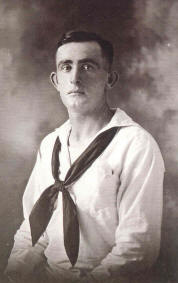 Gerald - WWI
|
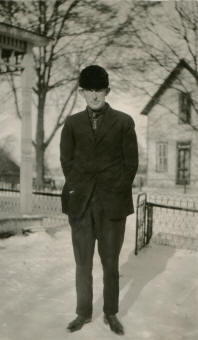 Gerald |
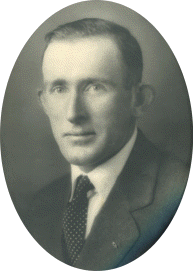 Gerald |
|
|
|
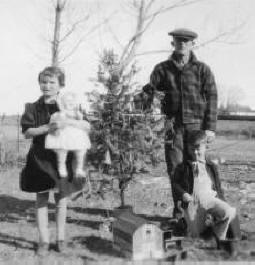 Twila, Gerald and Carl circa 1935
|
|
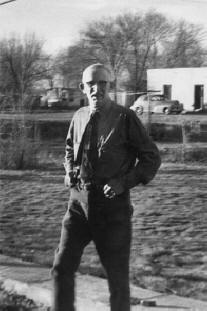 Gerald |
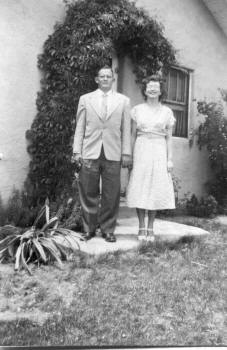 Carl & Twila |
|
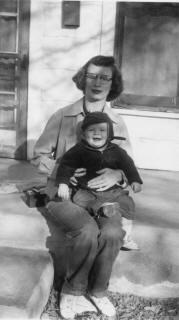 Twila & Bob Mark - 1953 |
|
|
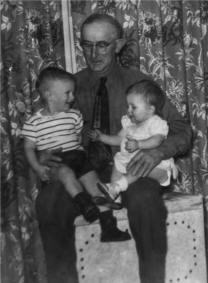 Bob Mark, Gerald, Annette |
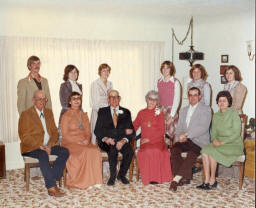 Gerald & Vada's 50th Wedding Anniversary - 1976 Daughter Twila & Bob, Son Carl & Audrey and all 6 grandchildren |
|
